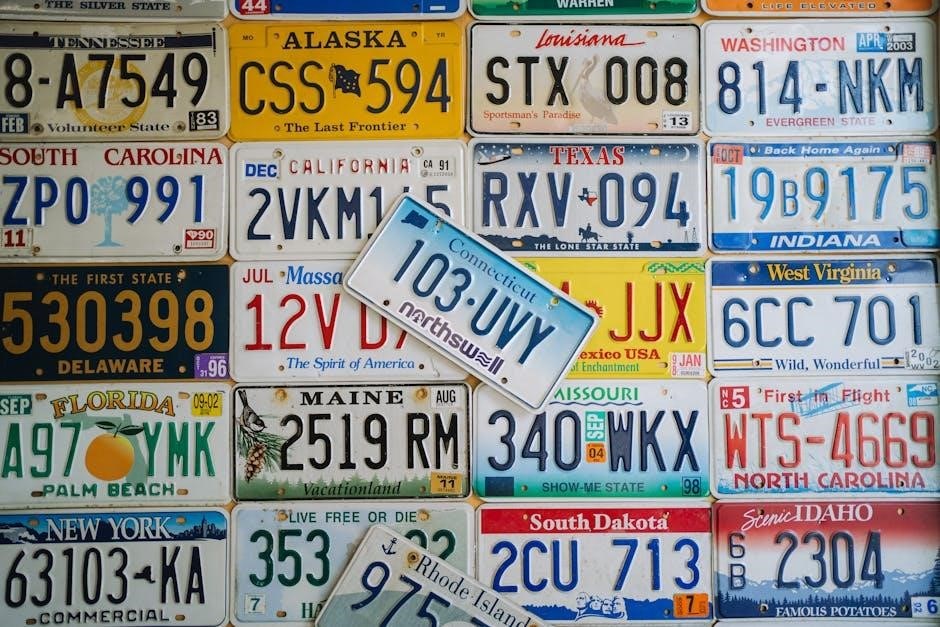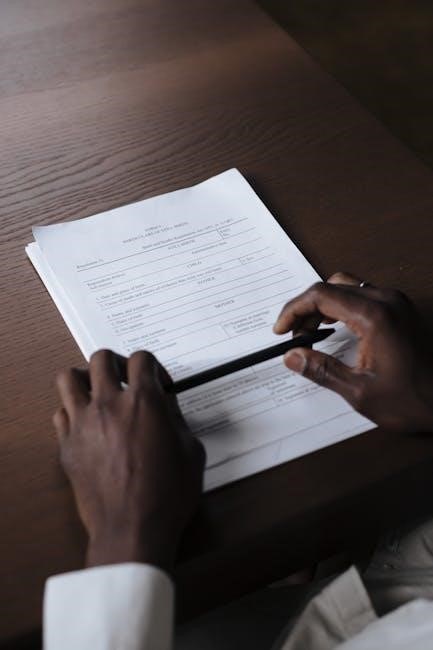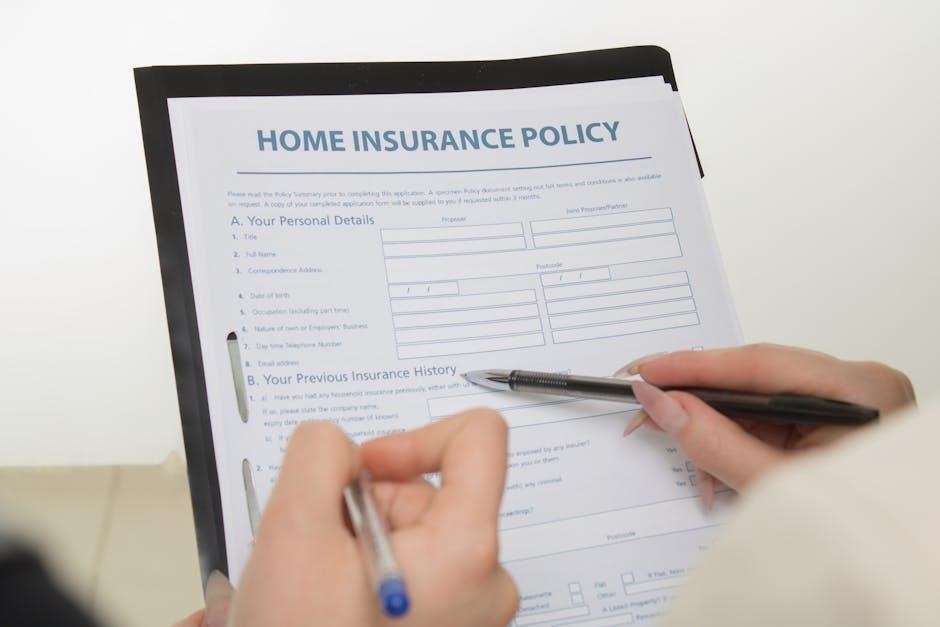Understanding the Hardship License in Louisiana
A hardship license in Louisiana is a restricted driving permit granted to individuals whose licenses have been suspended or revoked due to certain offenses. It allows limited driving privileges for essential purposes, such as commuting to work, school, or medical appointments. Eligibility is determined by the Louisiana Office of Motor Vehicles (OMV) based on the severity of the offense and the applicant’s financial or educational needs. This license aims to balance public safety with the necessity of maintaining daily responsibilities.
1.1 Definition and Purpose
A hardship license in Louisiana is a conditional driving permit issued to individuals who have had their licenses suspended or revoked but require limited driving privileges for essential activities. Its purpose is to allow individuals to maintain employment, attend school, or access medical care while ensuring public safety. This license is designed for those facing significant hardship due to the loss of driving privileges, providing a balanced solution to meet personal needs without compromising traffic safety standards.
1.2 Eligibility Criteria
To qualify for a Louisiana hardship license, applicants must meet specific criteria. They must have a suspended or revoked license due to eligible offenses, such as a first-time DUI or accumulation of points. Applicants must complete a mandatory suspension period and have no unresolved citations. They must demonstrate a significant hardship, such as needing to commute to work, school, or medical appointments. Eligibility may also depend on the nature of the offense and whether it involves alcohol or drugs. Applicants must prove their situation warrants limited driving privileges.
Application Process for a Hardship License
The application process involves obtaining and completing the hardship license form, submitting required documents, and attending a hearing with the Louisiana OMV to review eligibility.
2.1 Obtaining the Application Form
The hardship license application form can be obtained from the Louisiana OMV website or in person at a local OMV office. The form is typically available for download as a PDF document, allowing applicants to print and fill it out manually. Additionally, some OMV locations may provide physical copies upon request. It is essential to ensure the form is fully completed and signed before submission to avoid delays in processing.
2.2 Completing the Application Form
When completing the hardship license application form, applicants must provide accurate and detailed information. Personal details, employment information, and the reason for requesting a hardship license are typically required. Applicants must also explain their financial or educational hardships and list the essential purposes for which driving privileges are needed. The form should be filled out legibly and signed in the presence of a notary public to ensure authenticity. Incomplete or inaccurate submissions may result in processing delays or denial.
2.3 Submitting the Application
Once the application is completed, it must be submitted to the Louisiana Office of Motor Vehicles (OMV). Applications can typically be mailed to the specified OMV address or submitted in person at a local OMV office. Ensure all required documents, such as proof of identity, residency, and financial hardship, are included. A processing fee may also be required. Incomplete applications will not be processed, so double-check all details before submission. The OMV will review the application to determine eligibility for a hardship license.
Required Documentation
Applicants must submit proof of identity, residency, and financial hardship. Additional documents, such as employer verification, may be required to support the hardship claim.
3.1 Proof of Identity
Applicants must provide valid government-issued identification, such as a driver’s license, state ID, or passport. If the ID is expired, additional proof of identity may be required. Acceptable documents include a birth certificate or Social Security card. The Louisiana OMV may also accept other forms of identification under specific circumstances. Ensure all documents are legible and up-to-date to avoid delays in processing the hardship license application.
3.2 Proof of Residency
Applicants must submit documentation proving Louisiana residency, such as a utility bill, lease agreement, or bank statement, dated within the past 30 days. Additional acceptable documents include mortgage statements, tax filings, or employment records. The address on the provided documents must match the address listed on the hardship license application. Ensure all documents are valid and current to meet the OMV’s residency verification requirements for processing the application.
3.3 Proof of Financial Hardship
Applicants must provide evidence of financial hardship, such as recent pay stubs, employer letters, or tax returns, demonstrating a critical need for transportation. Documentation should reflect the inability to meet essential obligations without driving privileges. This includes proof of employment, school enrollment, or medical requirements. The submitted documents must be current and directly tied to the applicant’s financial situation to validate the necessity for a hardship license.
3.4 Employer Verification
Employer verification is required to confirm the applicant’s work schedule and necessity for transportation. A signed letter from the employer must detail the applicant’s job title, working hours, and the importance of driving for their role. This documentation helps establish the critical need for a hardship license, ensuring the applicant can maintain employment without undue hardship. The letter must be on company letterhead and dated within 30 days of the application submission.

Fees and Payments
Fees for a hardship license in Louisiana include an application fee and reinstatement fee. Payments must be made via money order or cashier’s check; personal checks are not accepted.
4.1 Types of Fees
The fees required for a hardship license application in Louisiana typically include a reinstatement fee, application fee, and a processing fee. These fees are non-refundable and must be paid in full at the time of submission. Additional fees may apply for late payments or if the license needs to be expedited. It’s important to verify the exact amount with the Louisiana OMV, as fees are subject to change. Payment methods accepted are usually limited to certified checks or money orders to ensure timely processing of the application.
4.2 Payment Methods
Payment for the hardship license application in Louisiana must be made using a certified check or money order. Cash and personal checks are generally not accepted. The payment must be submitted alongside the completed application form and required documentation. It’s essential to ensure the payment is made payable to the Louisiana Office of Motor Vehicles (OMV). Additional processing fees may apply for expedited services. Always verify acceptable payment methods with the OMV to avoid delays in the application process.
Court Hearing
Applicants must attend a court hearing to present their case for a hardship license. The judge evaluates the situation and decides based on the severity of the offense and the applicant’s circumstances.
5.1 Scheduling the Hearing
To schedule a hearing for a hardship license in Louisiana, applicants must file a petition with the court in their parish of residence. The court will set a hearing date, which may take several weeks. Applicants must provide advance notice to all relevant parties, including the District Attorney’s office. A filing fee may apply, and applicants should ensure all required documentation is submitted beforehand. The process can vary by jurisdiction, so consulting with legal counsel is recommended to ensure compliance with local procedures.
5.2 Preparing for the Hearing
Preparing for a hardship license hearing requires organizing all necessary documents, such as proof of identity, residency, and financial hardship. Applicants must demonstrate a clear need for driving privileges, such as employment or educational obligations. Practicing testimony and understanding the legal requirements is crucial. Legal representation can help present the case effectively. It’s essential to review the application and ensure all information is accurate and complete before the hearing date.

Restrictions of a Hardship License
A hardship license restricts driving to essential activities like work, school, or medical appointments. Specific time or route limitations may apply, ensuring compliance with court-ordered conditions.
6.1 Permissible Use
A hardship license allows driving for essential activities, such as commuting to work, school, or medical appointments. Specific time or route restrictions may apply, ensuring compliance with court-ordered conditions. The license is designed for limited, necessary use only, and any deviations from approved purposes may result in penalties. It is crucial to adhere strictly to the terms outlined in the license to maintain driving privileges and avoid further legal consequences.
6.2 Prohibited Activities
Holders of a hardship license in Louisiana are prohibited from driving for non-essential purposes, such as recreational activities or social events. Operating a vehicle under the influence of alcohol or drugs is strictly forbidden. Additionally, driving outside approved hours or routes without explicit permission can lead to revocation. Violations may result in fines, extended license suspension, or other penalties, emphasizing the importance of strict compliance with all conditions set forth in the hardship license agreement.

Post-Licensure Requirements
After obtaining a hardship license, recipients must comply with all conditions, including monitoring and documentation requirements. Regular renewal and maintaining eligibility criteria are mandatory to avoid revocation.
7.1 Monitoring and Compliance
Holders of a Louisiana hardship license must adhere to strict monitoring and compliance protocols. This includes regular check-ins with the Office of Motor Vehicles and maintaining required documentation, such as proof of employment or school enrollment. Any violations, like driving outside permitted hours or failure to meet financial obligations, can result in immediate suspension of the hardship license. Compliance is crucial to retain driving privileges and progress toward full reinstatement of a standard license.
7.2 Renewal Process
Renewing a hardship license in Louisiana requires submitting a new application and meeting updated eligibility criteria. Applicants must provide current proof of employment, school enrollment, or financial hardship. The Louisiana OMV reviews each case to determine if the hardship license should be extended or converted to a full license. The renewal process ensures ongoing compliance with state regulations and assesses whether the initial reasons for the hardship license still apply. Timely submission and completion of all requirements are essential for uninterrupted driving privileges.
Legal Consequences of Misuse
Misusing a hardship license in Louisiana can lead to increased penalties, including fines, jail time, or permanent loss of driving privileges. Compliance is strictly enforced.
8.1 Penalties for Violations
Misusing a hardship license in Louisiana results in severe penalties, including fines up to $1,000 and/or up to six months in jail; The license may be revoked permanently. Additional fees for reinstatement could apply, and repeat offenses worsen penalties. The court may also extend suspension periods or impose community service. Violators face increased insurance costs and long-term impacts on their driving record;
8.2 Impact on Future Licensing
Violating a hardship license in Louisiana can significantly impact future licensing. Multiple offenses may result in permanent license revocation. The OMV will impose stricter criteria for reinstatement, potentially requiring additional fees, court appearances, or extended waiting periods. A history of misuse may lead to heightened scrutiny in future applications. Repeat violations could also affect insurance rates and eligibility for licenses in other states, creating long-term consequences for driving privileges.

Resources and Assistance
Applicants can access legal aid services for guidance on hardship license applications. Community support programs also provide assistance with paperwork and understanding eligibility requirements.
9.1 Legal Aid Services
Legal aid services in Louisiana provide free or low-cost assistance to individuals applying for hardship licenses. These services, often offered by non-profit organizations, help applicants understand legal requirements and navigate the application process. Attorneys can review eligibility criteria, prepare necessary documentation, and represent clients in court if needed. Many legal aid providers also offer workshops or online resources to guide applicants through the process. These services are particularly beneficial for those who cannot afford private legal representation, ensuring equal access to the legal system and improving the likelihood of a successful application.
9.2 Community Support Programs
Community support programs in Louisiana offer assistance to individuals applying for hardship licenses, providing resources and guidance throughout the process. These programs often include workshops, online guides, and one-on-one consultations to help applicants understand eligibility criteria and gather necessary documentation. Many organizations also focus on addressing the underlying issues that led to license suspension, such as financial instability or lack of transportation, by connecting applicants with local resources and support services. These programs aim to help individuals regain independence and stability.
